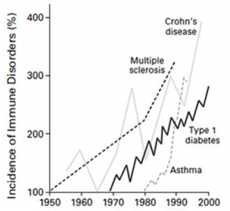Epstein Barr Virus and the Risk for Autoimmune Disease
Epstein Barr Virus (EBV) is virus that is responsible for what is called the kissing disease, or Mono which is short for mononucleosis. It is a virus that causes a common infection amongst children and the younger adult population because it is spread from saliva. Kissing, or even sharing a food utensil or a bottle of water can spread the virus. In children, infection may be asymptomatic. In a young adult the symptoms usually are fatigue, a sore throat, fever, swollen tonsils, swollen lymph nodes, and in more serious cases in those with a compromised immune system, an enlarged spleen, inflammation of the liver and jaundice (yellowing of the skin), myocarditis, meningitis, anemia, and low platelets. Blood testing in the active phase would show positive IgM antibodies to the virus. Most people recover between 4-6 weeks after onset of symptoms and would then test positive for IgG antibodies to EBV indicating that their immune system has natural immunity to the virus.
In May of 2023, a study out of Sweden showed a strong correlation between those who had M.S., (Multiple Sclerosis) also had an autoimmune cross reactivity to EBV. An autoimmune reaction that takes place in our body is when our immune system is primed to recognize a bad guy (in this case EBV) and it does so, but in the process, it also attacks a part of you that it should not. Cross reactivity is when there is a part of the bad guy that looks very much like a part of you (due to molecular mimicry) and the body attacks it. Therefore, autoimmune explains what happens and cross reactivity due to molecular mimicry explains why it happens.
This Swedish study included 713 people with M.S. and 722 people without M.S. When testing the blood for two things, EBNA1 (a protein on EBV) and a protein found in the central nervous system called CRYAB (alpha crystallin B), it was found that those people with positive autoimmune antibodies to CRYAB were twice as likely to have M.S. However, more telling was those who had positive autoimmune antibodies to both EBNA1 and CRYAB were nine times more likely to have M.S.! Therefore, previous exposure to EBV played a significantly higher risk factor for M.S. later in life. Since ninety percent or more of us have had exposure to EBV and have antibodies to it obviously only an extremely small percentage of those who has had EBV exposure will get M.S., so it remains to be determined what other factors play a role in why the immune system would react this way.
EBV causing an autoimmune response in M.S. has long been theorized but this study gave the clearest evidence that the association was so strong. Perhaps not surprisingly, EBV has been linked to other autoimmune issues such as rheumatoid arthritis, Hashimoto’s thyroid, SLE (systemic lupus erythematosus) and cancers such as nasopharyngeal cancer, Hodgkin’s lymphoma, and Burkitt’s lymphoma.
EBV is a herpes type virus and once we heal from the infection and develop antibodies the virus is dormant within us and potentially can be reactivated like other herpes viruses under certain circumstances. Stress or other infections can cause reactivated EBV. Doctors are now saying that in some cases of Long Covid, it is really a reactivated EBV that is the cause of their chronic symptoms. Here is a study about that.
EBV and all viruses require a strong TH1 response by our immune system. The TH1 response increases NK cell activation (natural killer cells) and macrophages to fight the virus. Another part of our immune system, the TH2 part, helps fight parasites, and helps against allergic responses, and when activated suppresses TH1. Therefore, if we have chronic gut flora imbalances, food allergies, or chemical sensitivities we have more energy working with the TH2 system and a lack of energy in the TH1 system and more likelihood that the viral infection will persist or reactivate.
Testing for EBV
There are four main blood tests that are used diagnostically.
There is one main test for an acute infection of EBV and that is VCA-IgM which is a viral capsid antigen test. This is a test for the presence of Epstein Barr Virus Capsid (coating) of the EBV.
The other tests are IgG tests which would indicate prior exposure. These include VCA-IgG which is an indication of prior infection to EBV capsid. EBNA IgG which is (Epstein Barr Nucleic Acid), and lastly EBV-EA-D IgG (Epstein Barr Virus Early Antigen Diffuse) which when elevated is the best predictor with about an 80% accuracy rate for a reactivated EBV case.
The following chart shows the significance of the above tests.
Treatment for EBV
There are antiviral medications that can be prescribed for treating either an acute infection or a reactivated infection. However, there are many herbal remedies that are also effective. Black Cumin Seed Oil which contains thymoquinone has been shown to be effective in vitro at helping suppress EBV infections. Other herbs such as Astragalus, Andrographis, or compounds like Berberine, and Monolaurin are also good antivirals that would help with an acute or reactivated EBV infection.
Conclusion
In the U.S. there has been an explosion of cases of autoimmune diseases in the past 75 years. There are over one hundred different autoimmune diseases and statistics vary from one in five to one in ten Americans has an autoimmune disease (more than cancer and heart disease combined). Seventy-five percent of those are women. If you look at this chart you can see that a small sample of autoimmune diseases has increased by 300-400% between 1950-2000. This is not to imply that EBV is the sole cause. It is related to many factors such as environmental stresses from chemicals and pesticides, altered gut microbiomes, and other toxins in our environment. However, EBV is one thing we can test for easily and with anyone displaying some autoimmune issue it should be ruled out as a potential trigger.
